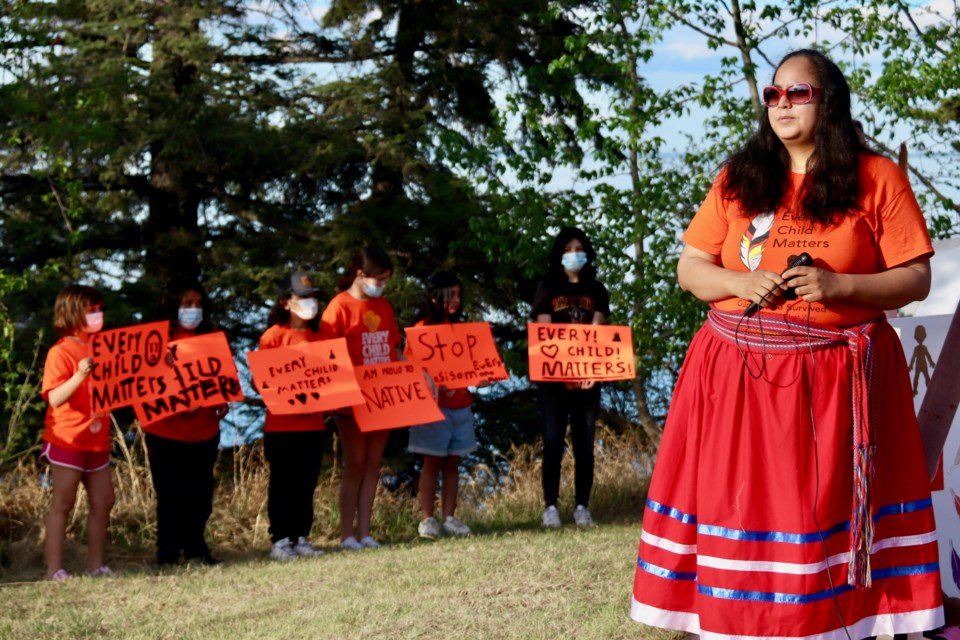COLD LAKE - Two-hundred-and-fifteen pairs of shoes - one for each child found and soul lost - circled the Residential Schools Survivor Monument in Cold Lake to mark a dark discovery at one of British Columbia's residential schools.
A mass grave containing the remains of 215 children was discovered at the Kamloops Indian Residential School. Across the country, Indigenous communities like Cold Lake First Nations, came together to mourn.
The Cold Lake Residential School Survivor Monument was a sea of orange on May 31 as survivors, members of Cold Lake First Nations and other Indigenous communities, elected officials, and the public gathered to share their stories and learn about the lasting impact these places had.
"Residential school is one of Canada's secrets and shames, and I feel like it needs more awareness," expressed Gabrielle Whiskeyjack, organizer of the event. "I'm not done raising awareness for our community."
Whiskeyjack, along with co-organizer Kelly Orr, knew they had to do something after they heard the news.
"A lot of people don't know about residential school; they just don't know," Whiskeyjack said. "We wanted more people to know because it's not talked about, it's not written about properly in our school curriculum."
Sharing their thoughts, experiences
“We knew there were a lot of children that died in these places, but we didn’t know the extent of it,” Agnes Gendron, Cold Lake First Nations elder, said during a prayer.
Gendron is a survivor of a residential school.
"It wasn't the good people of Canada; it was the government people that did this to us. The good people of Canada didn't know this was happening to us, to this day they don't know the whole story," she detailed, adding they won't let their stories and experiences go unheard.
Pointing to the monument Gendron said, "These children suffered for us so we can be who we are today."
They were punished for speaking their language, were victims of sexual abuse, and were hit with a meter stick for accidentally wetting the bed, described some of the elders, survivors, and their families who shared their heartbreaking stories.
"It wasn't easy going to residential school, the way I hear it," said one speaker. "When the fall comes, they take the children away from their parents, the mothers are hanging onto their babies, and yet, they take that child away."
When they arrived at the school, she continued, "they all get a haircut, all the same."
"Their language was taken away; they got a strapping if they spoke their language. They took everything away, they tried everything, but some of the women sitting here today, they kept their language."
She added, as a result of the abuse and treatment, "We've been angry and we have a lot of resentment, but a lot of us have dealt with that and we are the voice."
Another speaker stressed how it really wasn't that long ago that children were being sent to residential schools. In fact, she said, her own mother went to one.
"This is recent, our families, our great grandparents, suffered in those schools," she stated. "People say get over it, how can you get over that."
"These," she said pointing to the shoes, "were innocent babies that were taken from their families and had to suffer for us to be here."
She continued, "These souls, the joy and happiness that was taken from them, we can't let that be in vain... They never even had a chance to live, to know what love is, never to have their parents love them, they grew up with no love."
President of the Métis Nation, Audrey Poitras told the crowd that despite promises there would be change "today, in some of the systems, we still see it happening."
"As you go along over the years you think 'now will be when there will be change.' We know we've waited a long time; we've gone through many different periods when we believed there was a time when the healing would really happen and changes will be made so we will never see this again," expressed Poitras. "I believe today, what we're doing here today, we all need to stick together, we all need to make a difference, definitely the governments."
The issue, she said, isn't just federal, but provincial, and "it's time, I believe, to get to the bottom of that, so our future generations can go forward without having to continue to live through all that we do every time one more thing happens."
Poitras continued, "If we all stand together, I believe we can make a difference... So, let's continue, let's push our governments and do everything we possibly can."
Hearing from elected officials
Roger Marten, chief of Cold Lake First Nations, explained how most First Nations people have been "dealing with the outfalls of residential school and now the rest of the country will finally see what we, as First Nations, have always lived with."
Cold Lake First Nations Coun. Gina Russell's sister is a residential school survivor.
"She said, 'those children will never go home.' This is to honour them, to remember, and to never forget."
City of Cold Lake Mayor Craig Copeland couldn't imagine what it must have been like having your children taken away from you.
"I think as unfortunate as it is when we hear what happened in Kamloops, I think what it did was it shined a light on the story, that this really did happen," he added. "Maybe we need to look at all of the sites across Canada and investigate, but I think from a minimal standpoint we need to try to hold the federal government to look everywhere so people can be properly be buried and families can grieve."



